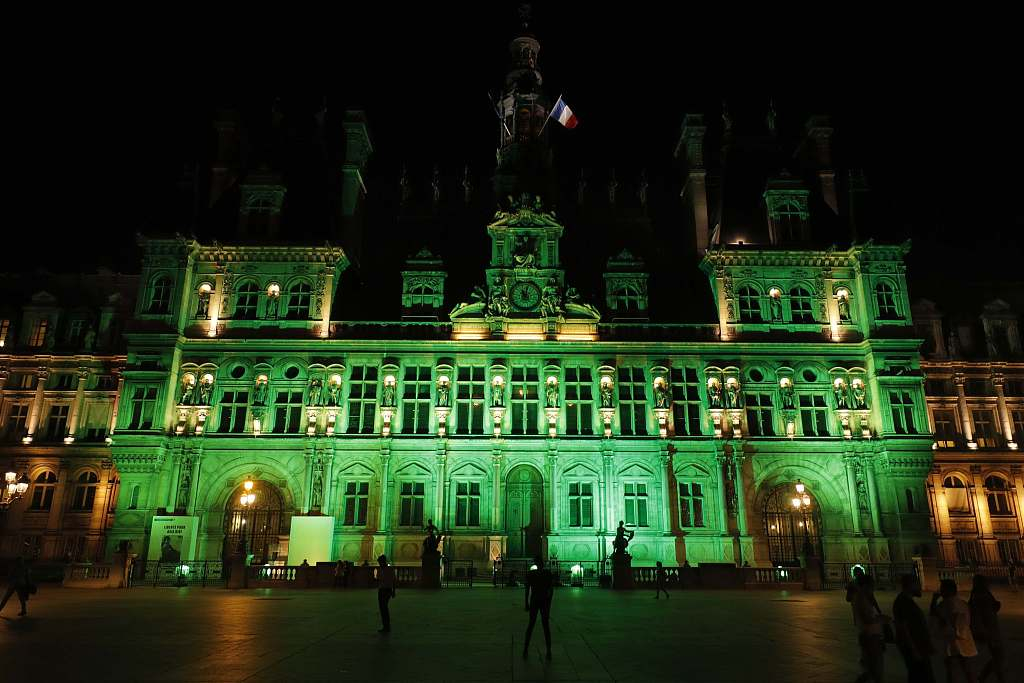
Editor's note: Alessandro Golombiewski Teixeira is a National Thousand Talent Distinguished Professor of Public Policy at the School of Public Policy and Management, Tsinghua University, and a professor of International Business at Schwarzman College in Tsinghua. He is a former Special Economic Advisor of the President of Brazil and former minister of Tourism, and minister of Development, Industry, and Foreign Trade of Brazil. He was also president of the World Investment Association – WAIPA. The article reflects the author's opinions, and not necessarily the views of CGTN.
One of the most commented current topics in international political arena is climate change. It is the defining issue of our time, and we need to act fast in order to preserve our world and natural biodiversity for our future generations.
Since the landmark agreement establish in Paris in 2015 by the United Nations (AKA The Paris Agreement) and ratified by 195 parties, countries are seeking to strengthen the global response to climate change, reaffirming the goal of limiting global temperature increase.
The target in the Paris Agreement is to reduce the temperature increase below two degrees Celsius, while pursuing efforts to limit the increase to 1.5 degrees and to accelerate and intensify the actions and investments needed for a sustainable low carbon future by 2030. In order to achieve this temperature goal, countries around the world has agreed to reach global peaking of greenhouse gas emissions (GHGs) as soon as possible, recognizing peaking will take longer for developing country.
The majority of countries that signed the Paris Agreement are not on track to meet its mandates. It is clear by now that the pace of changing is too slow in comparison to our pace of biodiversity destruction.

Hotel de Ville in Paris, France was lighted up with green lights after U.S. President Donald Trump withdrew the U.S. from the Paris Climate Agreement on June 1, 2017. /VCG Photo
Hotel de Ville in Paris, France was lighted up with green lights after U.S. President Donald Trump withdrew the U.S. from the Paris Climate Agreement on June 1, 2017. /VCG Photo
For example, countries that are expected to lead the world in this endeavor have acted with restrictive behavior instead of constructive ones, mixing the causes and effects of this process. That is clear in the case of France. President Emmanuel Macron has announced that France would not enter into any trade agreement with countries that have policies counter to the Paris Agreement and has criticized openly the Brazilian government, calling on the world leaders to intervene in the Amazon due to the massive fires destroying Brazil's Amazon rainforest. President Macron, during the G7 meeting in South France this year, stated that "Our house is burning. It is an international crisis. Members of the G7 Summit, let's discuss this emergency first order in two days."
Once again, President Macron was not clear about what France understands as "counter to the Paris Agreement", since France still discusses and implements trade measures and agreements with the U.S.. The U.S. is clearly against the implementation of such an agreement. This has been shown through the increasing of carbon dioxide emissions over the last five years, reversing a decade of decline. Emissions in the U.S. in 2018 increased by 3 percent from 2017.
It is clear by now that developed economies are not doing their part in the Paris Agreement. For example, last year's Global Carbon Project, an organization that seeks to quantify global greenhouse gas emissions and their causes, made an important disclosure that fossil carbon dioxide emissions grew in 2017 by 1.6 percent, after being stable from 2014 to 2016. Also, the 2018 numbers had confirmed an earlier projection: total carbon dioxide emissions from fossil fuels and industry rose by 2.7 percent. They are expecting that number to grow in 2019 and 2020.

Students are participating in the Global Climate Strike march on September 20, 2019 in New York City. /VCG Photo
Students are participating in the Global Climate Strike march on September 20, 2019 in New York City. /VCG Photo
If there is good news in sight, it is the Chinese commitment to reduce carbon dioxide emissions and expand renewable energy use. Wang Yi, State Councillor and Foreign Minister of China, offered this statement at the 74th United Nations General Assembly: "China Foreign Climate change is a global consensus. We need to respond to this challenge with concerted global efforts according to the principle of common but differentiated responsibilities...We will deliver what we have signed up to, fulfill our obligations, and work with real actions to contribute to the building of a clean and beautiful world".
China announced that it would cut emissions by over 12 billion tons annually and would pursue a path of high-quality growth and low carbon development through the reduction of coal consumption and production. This contributes to a major decline of an average of almost one percent per year. Second, China has decided to increase the mix of renewable fuels with fossil fuels. It has changed the law to call for an increase of E10, a mix of ethanol from corn and sugarcane that cuts carbon dioxide emissions by 90 percent on average compared to gasoline. It also plans for nationwide Chinese use of bioethanol fuel by 2020.
Although the actions of many developing countries such as China have been positively affecting the world of climate change, the larger picture is not so rosy. We have no signs that emissions are decreasing or stabilizing, which means that we will not meet the Paris Agreement's temperature goals or the Sustainable Development Goals.
This is deeply troubling considering the world is nearing the edge of environmental disasters, and we are at the edge of nowhere.
(If you want to contribute and have specific expertise, please contact us at opinions@cgtn.com)